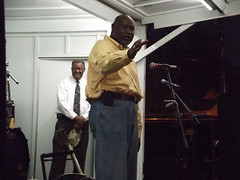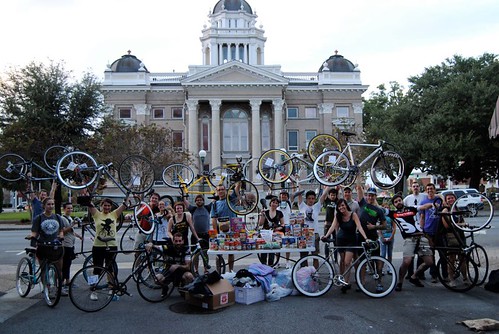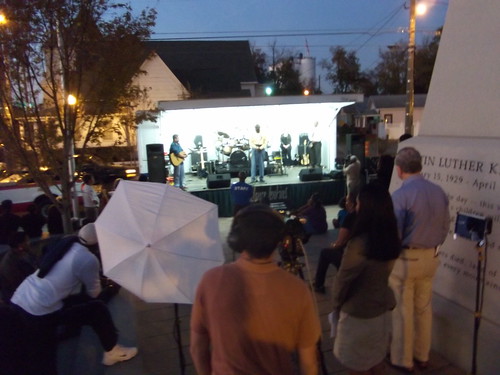Continue readingGeorgians have until Dec. 23 to comment on new state and congressional district maps. The U.S. Department of Justice is in the midst of its 60 day-review of the maps. Voter advocate groups say this may be the last chance to comment before the maps go into effect for a decade.
…
Elizabeth Poythress, president of the League of Women Voters of Georgia, says the Justice Department is eager to receive citizen comment.
“We’re just encouraging people to take the advantage they have
Category Archives: Activism
CUNY’s idea of a public meeting
That’s in a NYTimes story by Alice Speri and Anna M. Phillips, CUNY Students Protesting Tuition Increase Clash With Police. Interesting title considering that the content says that the public went to a public meeting and were violently attacked by police.Carlos Pazmino, 21, a City College student who helped organize the protest, said that after students began opening doors to the auditorium where the CUNY trustees were to hold a public hearing at 5 p.m., CUNY police officers surrounded the entrances and pushed back, using their batons, and that when students formed a line to push past, the officers began hitting the students with the batons.
“I saw two people knocked down by cops,” Mr. Pazmino said. “They were arrested and one guy’s head was bleeding.”
And that’s the cleaned up version: Continue reading
Baltimore’s place-based model
Vanessa Barrington wrote for Grist 21 November 2011, Baltimore’s can-do approach to food justice
That’s the problem.…43 percent of the residents in the city’s predominantly black neighborhoods had little access to healthy foods, compared to 4 percent in predominantly white neighborhoods. Meanwhile, more than two-thirds of the city’s adults and almost 40 percent of high school students are overweight or obese.
There are solutions:
Speaking on a panel at the recent Community Food Security Coalition Conference in Oakland, Calif., Abby Cocke, of Baltimore’s Office of Sustainability, and Laura Fox, of the city health department’s Virtual Supermarket Program, outlined two approaches to address the city’s food deserts. Both were presenting programs that have launched since Grist last reported on Baltimore’s efforts to address food justice. And both programs come under the auspices of The Baltimore Food Policy Initiative, a rare intergovernmental collaboration between the city’s Department of Planning, Office of Sustainability, and Health Department. They also show how an active, involved city government and a willingness to try new ideas can change the urban food landscape for the better.The article outlines the specific solutions, such as: Continue readingAccording to Cocke, Baltimore’s Planning Department has a new mindset. She calls it a “place-based” model. “In the past,” she says, “growth was seen as the only way to improve the city, but we’re starting to look at ways to make our neighborhoods stronger, healthier, and more vibrant places at the low density that they’re at now.”
Militarization of Police and Private Prison Profiteering: the Connection
Norm Stanager wrote for YES! Magazine (via AlterNet) 17 November 2011, Police Chief Who Oversaw 1999 WTO Crackdown Says Paramilitary Policing Is a Disaster
Did anybody consider informing the protesters of the issues and asking for cooperation, or checking to see if there were alternate routes for emergency vehicles, or…. Hey, I’m not a professional emergency responder, but surely there must be a plan B in case some major intersection is out of commission due to a water main blowout, natural gas leak, earthquake, or whatever.Then came day two. Early in the morning, large contingents of demonstrators began to converge at a key downtown intersection. They sat down and refused to budge. Their numbers grew. A labor march would soon add additional thousands to the mix.
“We have to clear the intersection,” said the field commander. “We have to clear the intersection,” the operations commander agreed, from his bunker in the Public Safety Building. Standing alone on the edge of the crowd, I, the chief of police, said to myself, “We have to clear the intersection.”
Why?
Because of all the what-ifs. What if a fire breaks out in the Sheraton across the street? What if a woman goes into labor on the seventeenth floor of the hotel? What if a heart patient goes into cardiac arrest in the high-rise on the corner? What if there’s a stabbing, a shooting, a serious-injury traffic accident? How would an aid car, fire engine or police cruiser get through that sea of people? The cop in me supported the decision to clear the intersection. But the chief in me should have vetoed it. And he certainly should have forbidden the indiscriminate use of tear gas to accomplish it, no matter how many warnings we barked through the bullhorn.
My support for a militaristic solution caused all hell to break loose. Rocks, bottles and newspaper racks went flying. Windows were smashed, stores were looted, fires lighted; and more gas filled the streets, with some cops clearly overreacting, escalating and prolonging the conflict. The “Battle in Seattle,” as the WTO protests and their aftermath came to be known, was a huge setback—for the protesters, my cops, the community.
This article was published a few days before the UC Davis pepper spray events, but the author explicitly cites what happened to Scott Olsen in Oakland and the arrests in Atlanta, saying those are continuations of the same problems he experience in Seattle in 1999.
Then he gets into why: Continue reading
CCA charges inmates five days’ pay for one telephone minute
Amanda Peterson Beadle wrote for ThinkProgress 16 November 2011, Private Prison Charges Inmates $5 a Minute for Phone Calls While They Work for $1 a Day
Last year the Corrections Corporation of America (CCA), the nation’sThey charge for food, too.largest private prison company, received $74 million of taxpayers’ money to run immigration detention centers. Georgia, receives $200 a night for each of the 2,000 detainees it holds, and rakes in yearly profits between $35 million and $50 million.
Prisoners held in this remote facility depend on the prison’s phones to communicate with their lawyers and loved ones. Exploiting inmates’ need, CCA charges detainees here $5 per minute to make phone calls. Yet the prison only pays inmates who work at the facility $1 a day. At that rate, it would take five days to pay for just one minute.
And remember, CCA profits from anti-immigration laws, at taxpayer expense:
Recent anti-immigration laws in Alabama (HB56) and Georgia (HB87) guarantee that neighbor facilities will have an influx of “product.” In the past few years, CCA has spent $14.8 million lobbying for anti-immigration laws to ensure they have continuous access to fresh inmates and keep their money racket going. In 2010 CCA CEO Damon T. Hininger received $3,266,387 in total compensation.Private CEO profit for public injustice. Does that seem right to you?
 We don’t need a private prison in Lowndes County, Georgia.
Spend those tax dollars on rehabilitation and education instead.
We don’t need a private prison in Lowndes County, Georgia.
Spend those tax dollars on rehabilitation and education instead.
-jsq
Plymouth Rock n Ride, Sunday 20 November —Matt Portwood
John,
A group of local cyclists collected over 60 food items and over 200 clothing items while riding in the Plymouth Rock-n-Ride Charity Bicycle Ride on Sunday November 20th. The cyclists rode to various checkpoints throughout Valdosta featuring different challenges to be completed. The group also visited grocery store checkpoints to buy a variety of food
items for a local charity. The riders then delivered the food and clothing donations to the Saint Francis Center Ministry Outreach program on Mary Street. Prizes from local sponsors (Red Door Records, Western Auto, Valdosta Bike Center and Salem Records) were awarded to the 1st, 2nd, 9th, and 13th place finishers in the ride.
Matt
Mic check stops a police riot at UC Davis
 By now you’ve probably seen the video of UC Davis police pepper spraying peaceful protesters who were simply sitting on the gorund.
But have you seen what happened next?
Police were forming up with weapons raised surrounded on three sides by protesters, when someone yelled “Mic check!”
Follow
this link.
Or, if you want to see it starting with the pepper spraying:
By now you’ve probably seen the video of UC Davis police pepper spraying peaceful protesters who were simply sitting on the gorund.
But have you seen what happened next?
Police were forming up with weapons raised surrounded on three sides by protesters, when someone yelled “Mic check!”
Follow
this link.
Or, if you want to see it starting with the pepper spraying:
The one with the two pepper spray cans appears to be the same police lieutenant who pepper sprayed the protesters. As the protesters say through the human microphone that they are willing to let the police just walk away, even after the police had assaulted them with pepper spray, that same lieutenant motions to the police, who lower their weapons and back away.
Occupy Valdosta General Assembly today
 Noon until 3PM today, in Drexel Park, Valdosta, Lowndes County, Georgia,
Occupy Valdosta will be having a General Assembly.
This is the slow, messy, talkative, oddly organized, flashy-fingered
decision-making forum descended from the direct democracy of ancient Athens.
The General Assembly method is
why Occupy Wall Street is two months old
instead of being a one-shot one-day march.
Noon until 3PM today, in Drexel Park, Valdosta, Lowndes County, Georgia,
Occupy Valdosta will be having a General Assembly.
This is the slow, messy, talkative, oddly organized, flashy-fingered
decision-making forum descended from the direct democracy of ancient Athens.
The General Assembly method is
why Occupy Wall Street is two months old
instead of being a one-shot one-day march.
Occupy Atlanta has published a General Assembly Guide which includes this Occupy Atlanta Pledge and Guidelines derived from Occupy Wall Street: Continue reading
FVCS Final Meeting 15 November 2011
Sam Allen,
as he has before,
called for
reconciliation of opponents on the recent school consolidation referendum,
 and support of the two school systems,
financially and otherwise.
and support of the two school systems,
financially and otherwise.
In addition to FVCS regulars such as JC Cunningham, Chamber Chair Tom Gooding was there, as were current Valdosta Mayor Sonny Vickers and Mayor-Elect John Gayle, plus re-elected Valdosta City Council At-Large Ben Norton. Valdosta School Superintendent Cason was there. I didn’t see Lowndes Superintendent Smith, although various members of Continue reading
No Private Prison Petition
 have never heard of it,
and many of them want to know where they can find out more.
Linked from
the front page of the LAKE website
is
the letter to the Industrial Authority people are signing,
which in turn has links to
an online petition
and
a large amount of background material.
have never heard of it,
and many of them want to know where they can find out more.
Linked from
the front page of the LAKE website
is
the letter to the Industrial Authority people are signing,
which in turn has links to
an online petition
and
a large amount of background material.
Feel free to use any of this as pointers to research for writing your own letter, of course.
We don’t need a private prison in Lowndes County, Georgia. Spend those tax dollars on rehabilitation and education instead.
-jsq

